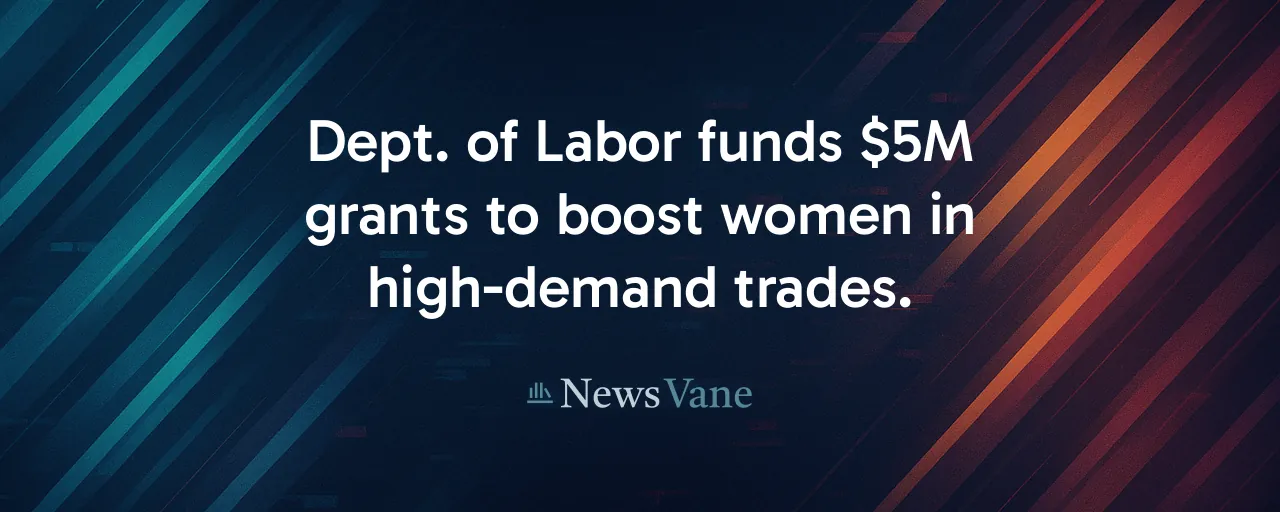A Bold Step for Workforce Growth
The U.S. Department of Labor has unveiled a $5 million initiative to fund up to 14 grants, designed to bring more women into high-demand fields like construction, manufacturing, and cybersecurity. Announced on July 9, 2025, by Secretary Lori Chavez-DeRemer, the grants aim to expand Registered Apprenticeship programs, addressing a critical shortage of skilled workers. This move signals a focused effort to strengthen the nation's workforce while opening pathways for women in industries where they remain underrepresented.
These grants, part of the Women in Apprenticeship and Nontraditional Occupations (WANTO) program, support community-based organizations that recruit, train, and retain women in Registered Apprenticeships and high-demand occupations. With industries like infrastructure and technology facing persistent labor gaps, the initiative seeks to align training with economic needs. The announcement comes after a turbulent period of program scrutiny, highlighting a renewed commitment to measurable outcomes.
For many women, these apprenticeships represent a chance to secure family-sustaining careers without the burden of college debt. By combining on-the-job training with classroom instruction, apprenticeships provide a practical route to skills mastery. The focus on women addresses a long-standing gender gap in fields where men still dominate, aiming to create a more balanced and resilient workforce.
Why the Push Matters Now
The timing of the grants reflects urgent economic realities. Industries critical to national growth, including manufacturing and cybersecurity, face a shortfall of qualified workers. Since early 2025, over 145,000 new apprentices have registered nationwide; women make up only about 14 percent of this group. Closing this gap could bolster economic output while reducing reliance on public assistance for low-income households.
Research underscores the value of targeting women for these roles. Studies show that women who complete WANTO-supported programs are more likely to secure skilled jobs and stay employed long-term. Comprehensive training, paired with services like childcare and mentorship, significantly boosts completion rates. These supports address barriers like workplace harassment or family responsibilities, which often deter women from entering or remaining in male-dominated fields.
The grants also respond to broader workforce trends. As infrastructure investments expand under recent federal policies, demand for skilled labor in construction and energy is surging. Cybersecurity, too, faces a growing need for talent as digital threats evolve. By equipping women with in-demand skills, the WANTO program aims to meet these challenges while promoting economic mobility.
A Program With Deep Roots
The WANTO program, authorized by Congress in 1992, has long worked to increase women's presence in nontraditional occupations. Over the decades, it has funded community organizations to provide pre-apprenticeship training, mentorship, and job placement services. From 2016 to 2021, bipartisan support led to increased funding and added flexibilities, such as covering childcare costs, which proved critical for participants.
The program has faced challenges, even with its successes. In May 2025, the Department of Labor paused several WANTO grants amid a review of federal funding priorities. This sparked legal battles, with courts issuing injunctions to protect some awards. The July 2025 announcement reflects a compromise, resuming funding with a focus on clear metrics, such as job placements and wage gains, to ensure taxpayer dollars deliver results.
Historical data supports the program's impact. Past WANTO participants have earned higher wages than peers with similar education levels, and their completion rates rival those of men when supportive services are in place. Women still earn a median of $22 per hour upon exiting apprenticeships, compared to $34 for men, highlighting persistent wage gaps tied to occupational segregation.
Balancing Priorities in a Divided Landscape
The relaunch of WANTO grants navigates a complex policy environment. Some stakeholders, including industry leaders and unions, praise the focus on measurable outcomes and alignment with high-growth sectors. They argue that clear performance metrics ensure accountability and help employers meet pressing labor needs. Community organizations emphasize that supportive services, like transportation or anti-harassment training, remain essential to women's success.
Debates over the program's direction reveal competing priorities. Advocates for fiscal responsibility emphasize the need to avoid duplicative spending, while supporters of gender equity argue that targeted investments are vital to address structural barriers. Both sides agree on the importance of skilled labor and the potential of apprenticeships to deliver high returns on public investment.
A 2023 study found that apprenticeships are among the most cost-effective pathways to middle-class wages, with completers earning more than non-apprentices with similar credentials. For women, the benefits are even clearer: targeted programs reduce dropout rates and increase long-term employment. The challenge lies in scaling these efforts without sacrificing quality or alienating key partners like employers and state agencies.
Looking Ahead With Clear Goals
The $5 million in new grants represents a modest but meaningful step toward addressing labor shortages and gender disparities. By funding up to 14 community-based organizations, the initiative will support tailored programs that prepare women for apprenticeships in fields like construction and technology. Success will hinge on collaboration among employers, unions, and training providers to ensure women enter and thrive in these roles.
Transparency and evaluation will be critical. Experts recommend rigorous tracking of outcomes, such as completion rates and wage growth, to build trust in the program's impact. Partnerships with state apprenticeship agencies and community colleges can also expand reach, ensuring more women benefit from training that aligns with local job markets.
As the nation grapples with economic and workforce challenges, initiatives like WANTO offer a practical way to strengthen industries and empower individuals. By investing in women's skills and removing barriers to their success, the program aims to create a more inclusive and prosperous future, one apprentice at a time.
